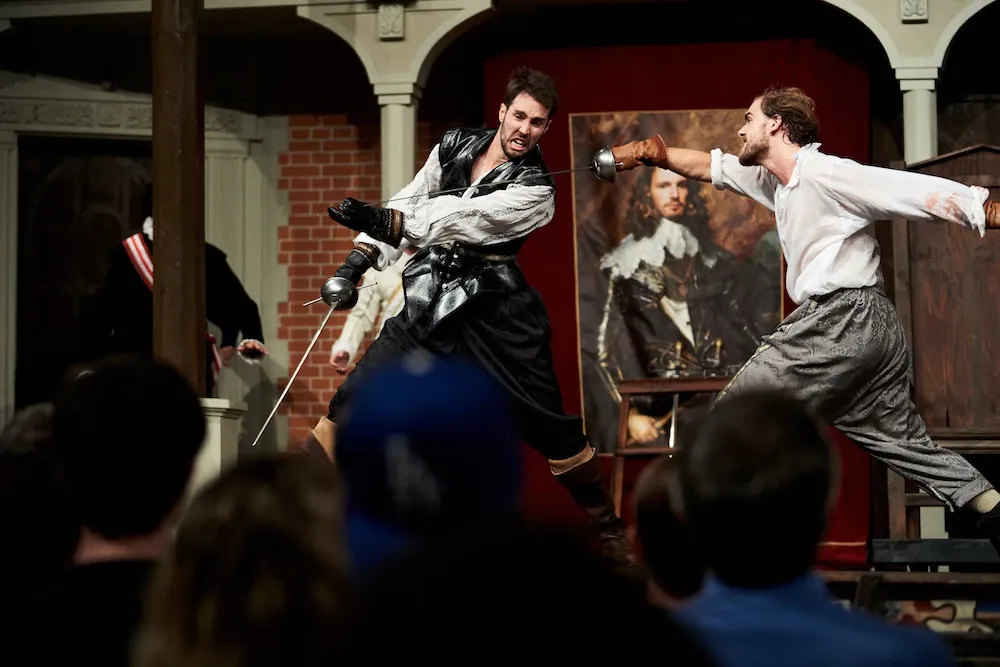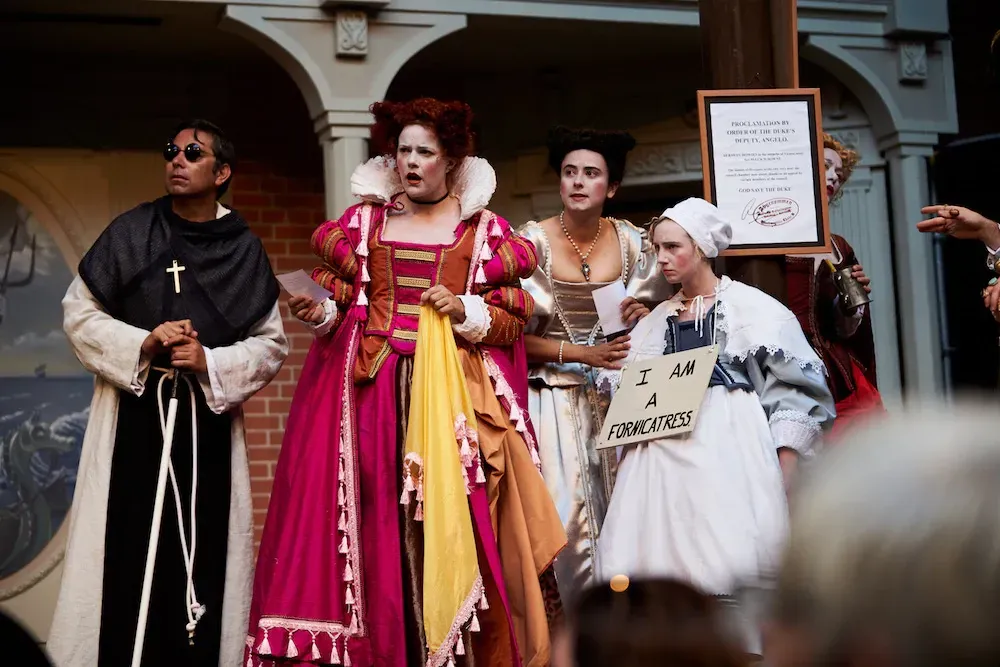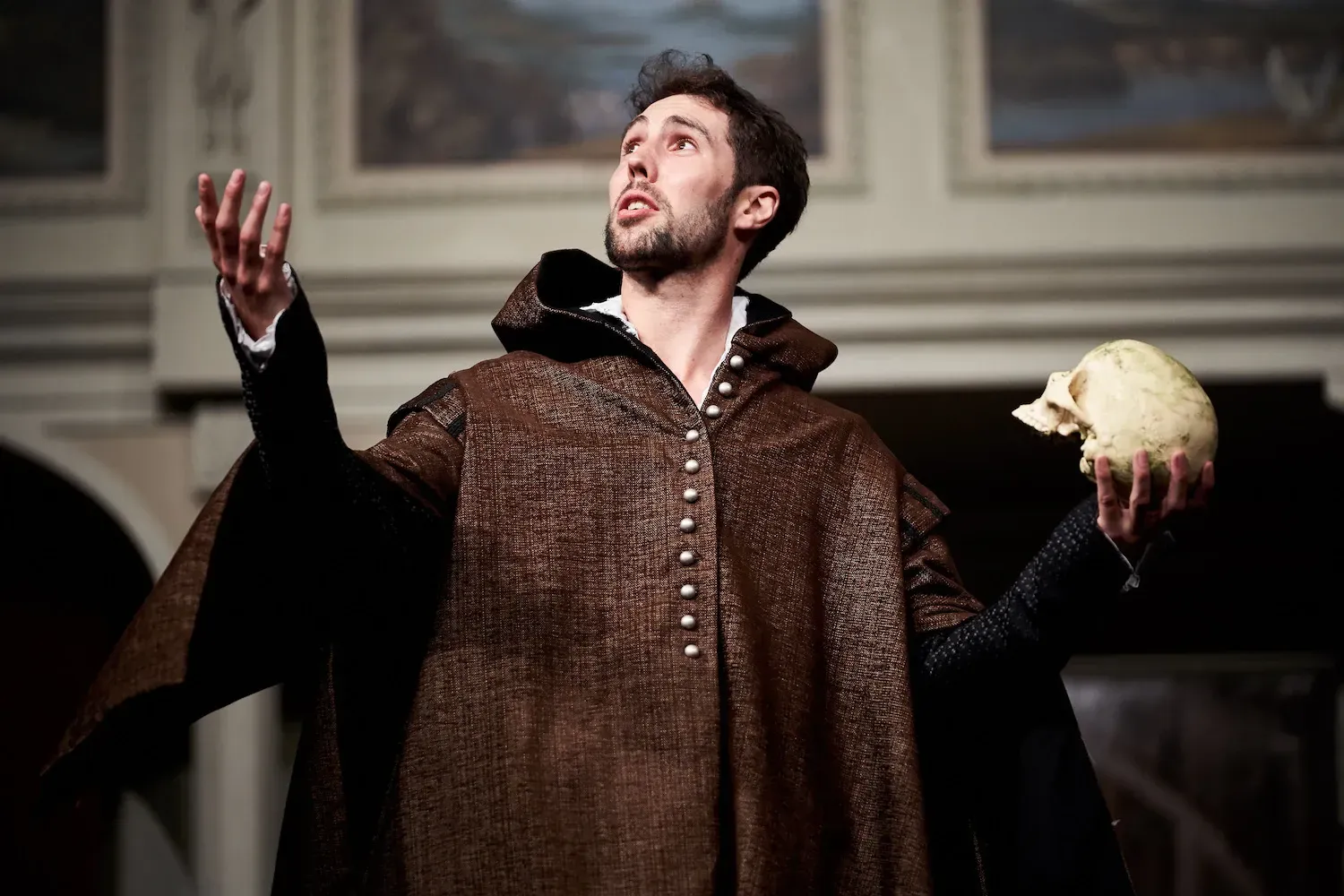Tough Crowd: Review of Pop Up Globe’s Measure for Measure and Hamlet
Written by
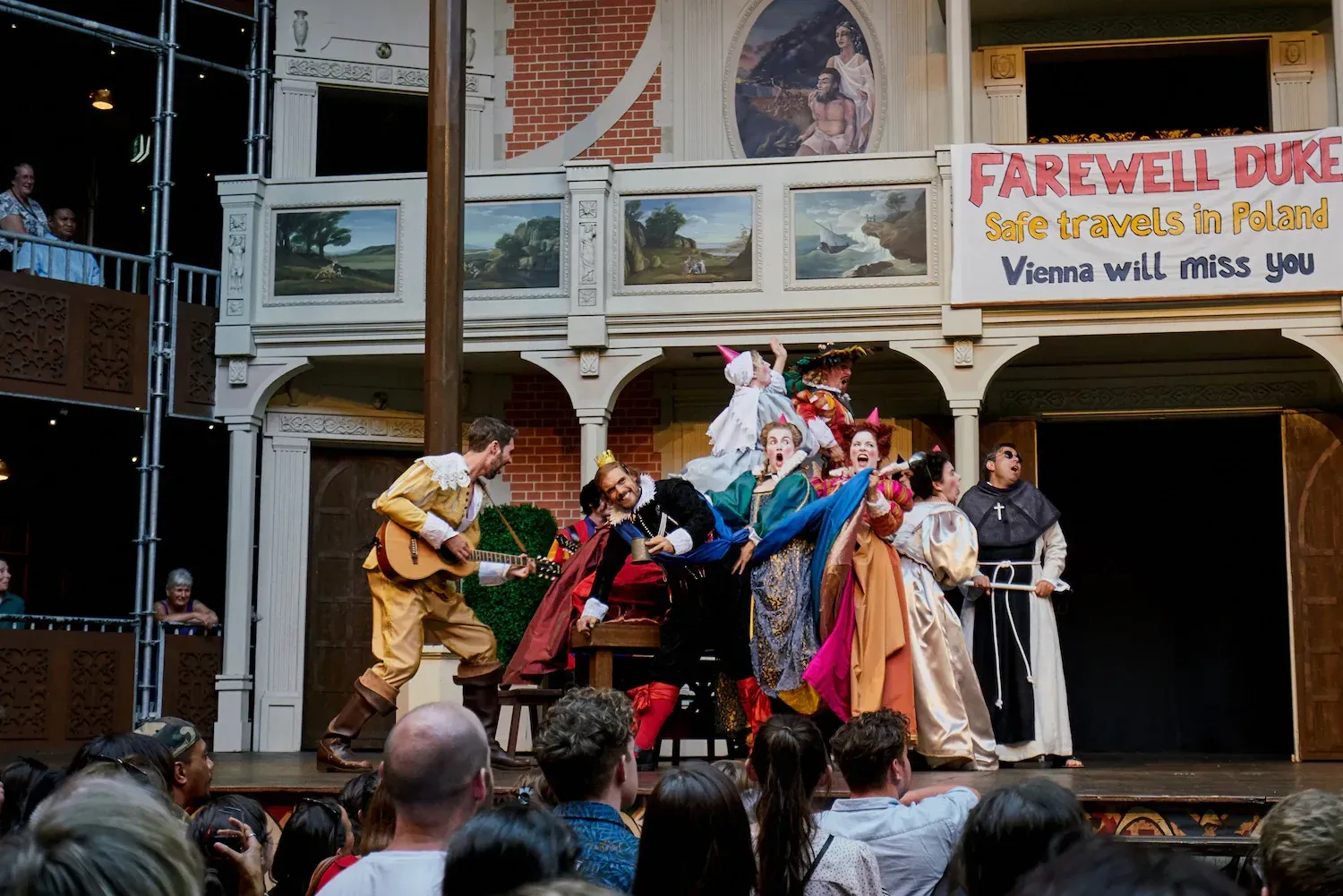
Much like Shakespeare himself, an evening at the Pop Up Globe intertwines contradictions, missteps and flourishes to create quite the spectacle. How much you want to take away from it depends on if you have come to be entertained or to cast a critical eye.
Living, breathing Shakespeare
The thing about Shakespeare is that he is both of his time, and yet timeless. His plays are living, breathing works that wrestle with the most complex themes of humanity. Yet they have died a thousand deaths in a sixth form English classroom, read aloud to the confused apathy of 30 teenagers.
Pop Up Globe champions accessibility
Given that Shakespeare is meant to be seen live, it is important to stress the good work the Pop Up Globe does in righting the initial experiences of so many. The unique viewing experience coupled with the comforting familiarity and fame of his stories is perhaps part of the reason the Pop Up Globe continues to be a runaway success in its fourth season. They have brought over a thousand performances to over 620,000 people. That alone is surely a remarkable feat.
We don’t live in a cultural desert, which means the Pop Up Globe is not the sole oasis.
Also impressive is that to pre-book standing tickets will set you back a whole $5. In a myriad of ways, the Pop Up Globe is making theatre accessible to those who might not usually attend. It would be even better to see it act as a gateway to the wealth of other reasonably priced theatre available across Auckland on any given week. We don’t live in a cultural desert, which means the Pop Up Globe is not the sole oasis.
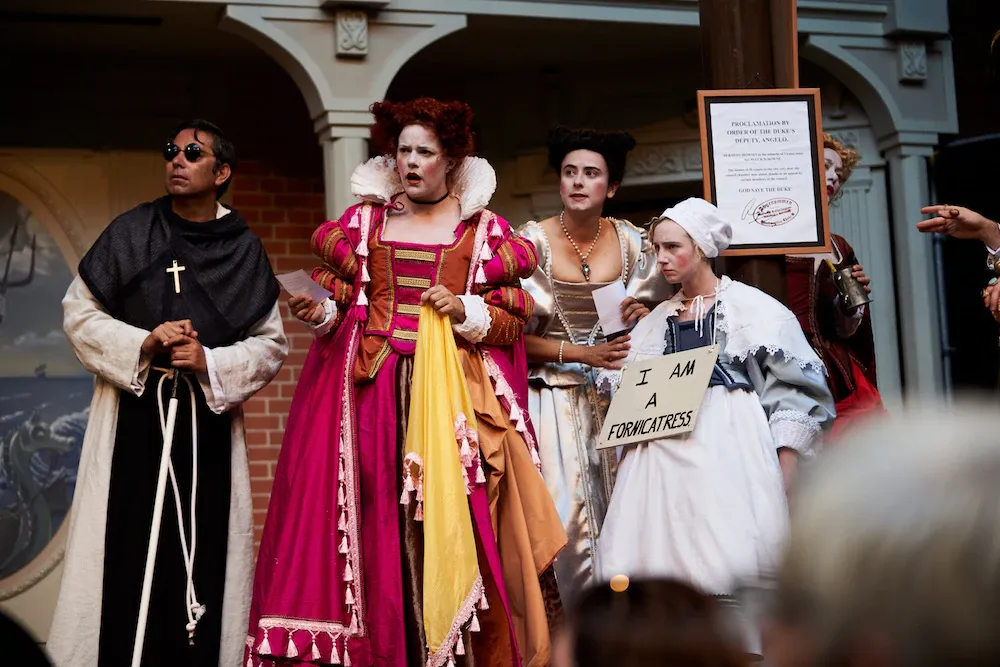
Abuse of Power
Measure for Measure and Hamlet are billed as partner plays and round off the Pop Up Globe’s controversial ‘Abuse of Power’ series. Although righted, it is important to readdress the issues caused by initial marketing and casting decisions, as their spectres cast long shadows over the weaknesses of each performance. The Pop Up Globe should have never been allowed to use #metoo and #timesup in their schtick; they were right to pull it. It came across tone deaf at best and belittling to survivors of sexual assault at worst. The fact that this modern movement against the world’s oldest issue was paired with the now-retracted and thoroughly outdated notion of having an all-male cast of Taming of the Shrew completely dulled whatever attempt at relevance they were going for.
This issue with tone dogged both performances. For a director, the risk with Shakespeare is that to a modern audience, his floral language is tedious and inaccessible. So time must be spent untangling language and intent, establishing a relatable subtext. This is then intertwined with all of the other aspects that go into creating a production to make a cohesive whole. The admirably breakneck speed that the Pop Up Globe operates at could perhaps be the reason that they stumbled at this critical stage.
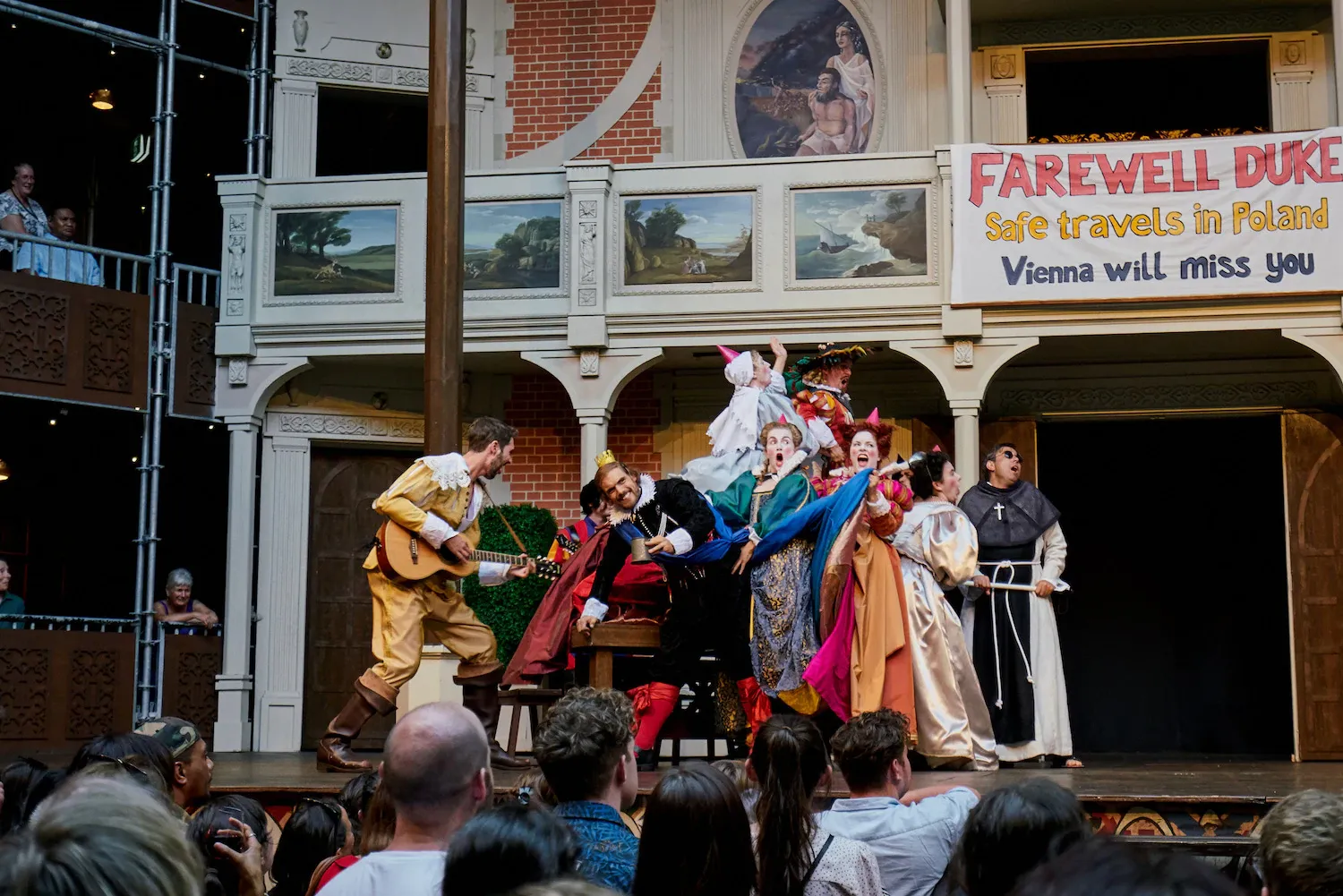
Measure for Measure
Given the complexity of Shakespeare’s words, it is easy to grab too firmly onto his more humorous lines. When overdone, this can detract from the more nuanced aspects of the script, making for one-note viewing. Measure for Measure is a problem play, a black comedy that speaks to virtue and vice, the dichotomy of virgins and whores.
In the programme notes, Dr. Miles Gregory attributes “the many high profile allegations against people in positions of power who have abused the trust placed in them, often sexually” as a reason for putting Measure for Measure on now. He is not alone in this. A quick Google search will show that directors around the world have had the same thought. Unfortunately, the Pop Up Globe’s Measure for Measure completely missed the bleak drama that makes for good black comedy. Rather, it was a surface-level good naturedly bawdy romp, best exemplified by Max Loban’s comedia dell’arte inspired turn as Lucio. Perhaps it could be argued that the over-amplification of humour could be a comment on the smoke and mirrors employed by those in power to jolly those around them into submission or silence? But that might be overthinking it.
Measure for Measure is a problem play, a black comedy that speaks to the dichotomy of virtue and vice.
Another nail in the coffin at their attempt to explore Measure for Measure against the backdrop of “high profile allegations” comes in the final scene (SPOILERS AHEAD). The leading lady, Isabella, a nun (well played by Rebecca Russell) is proposed to by The Duke (Will Alexander) who has spent the entire play pretending to be someone else. Traditionally, she never gives her answer. But in the Pop Up Globe’s version it appears that she agrees.
The Pop Up Globe, like many companies, edits Shakespeare to suit their needs (Hamlet is cut down to a mere 2 hours, 15 minutes). But if making the changes from tradition, why this specific change? If they were interested in exploring the themes in Measure for Measure in relation to the aforementioned backdrop, surely it would have been more powerful if she had said no? The nods toward contemporary sexual politics came across as a grand statement of intent that ultimately said nothing. However, it must be said that the excellent use of costumes and makeup captured the Moulin Rogue aesthetic well and was a nice touch. Overall, the play presented a fun night guaranteed to entertain. But they never quite delved into the horrors of Measure for Measure to make it a more rounded production.
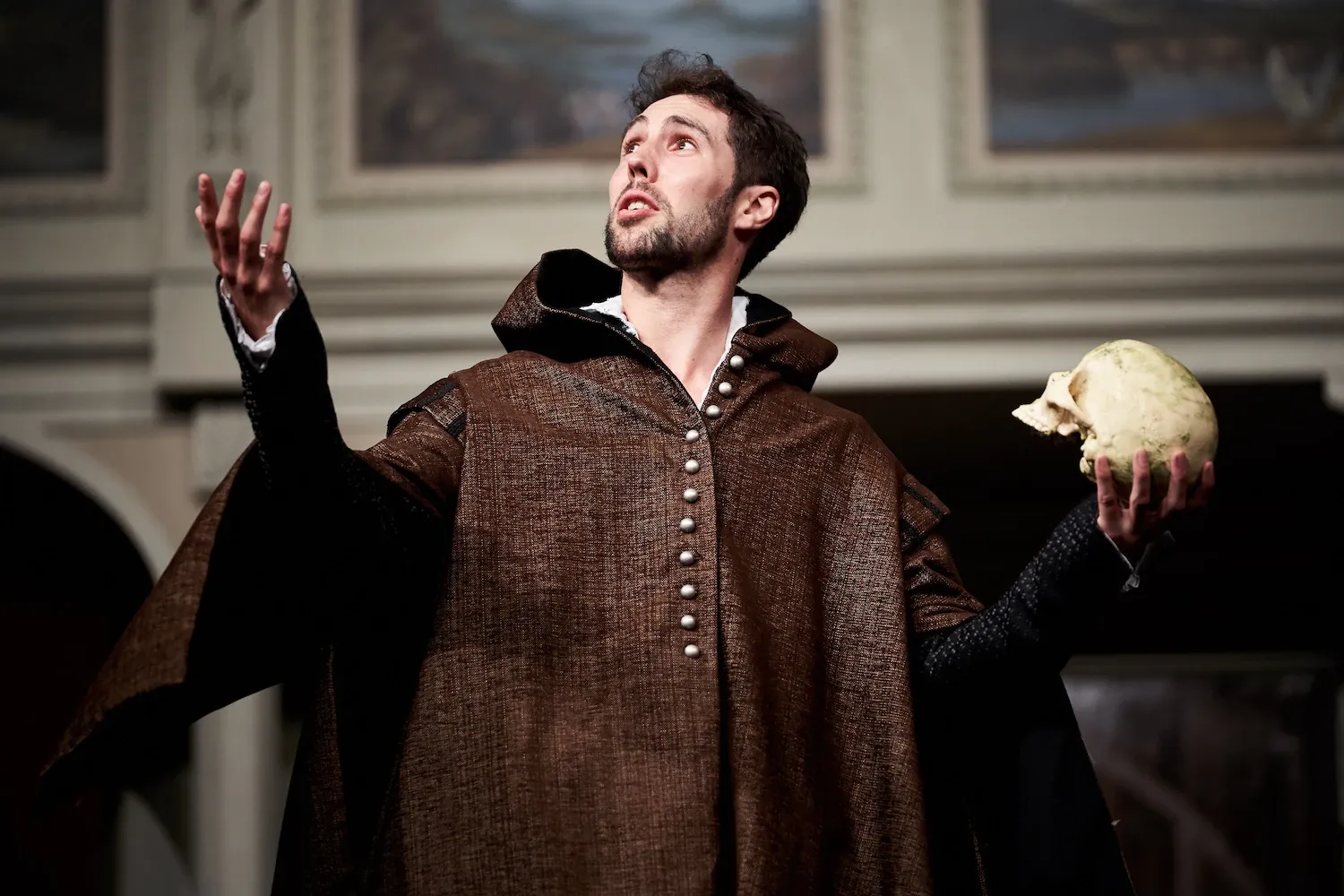
Hamlet
The tone in Hamlet was considerably more measured. Adrian Hooke took the titular role, and did an admirable job. He honed in on the angsty, pathetic aspects of Hamlet’s character, coding the character as the original thespian incel. You could see his anxieties and inadequacies churning across his face during his misogynistic outbursts. Meanwhile he kept the audience sympathetic with ironic glances across the fourth wall, a self-aware scoff and exasperated lift of the hand.
The high drama of the play shone through in some outstanding pieces of stagecraft and acting (..)
The high drama of the play shone through in some outstanding pieces of stagecraft and acting, especially the scenes featuring the ghost of Hamlet’s father, and the climactic sword fight. It was unfortunate that once again, much of the emotional impact was lost to tonal whiplash. Ophelia lacked a descent into madness, seeming instead to abruptly arrive there - for all, actress Summer Millett played those scenes brilliantly. However, the costume department were once again on form with Ophelia’s garb; her floral dress not only overtured her demise, it also referenced the John Everett Millias painting. Salesi Le’ota struggled with the role of Polonius; due to some misplaced inflections it was hard to believe he was a doting father. The comedic elements of the play were a little too played up, delighting the amused audience in the moment but leaving them disengaged from the ensuing tragedies. This was especially true of the gravediggers, as once again what could have been pitch black humour was played as high camp, fourth wall breaking silliness. This particular scene also emphasised the proclivity of The Pop Up Globe to not maintain the fine balance required when intertwining the past and the present. This issue was across both performances, ultimately proving to be distracting and taking away from the subtleties and depth that makes Shakespeare so fantastic.
After a few Madonna references and nipple jokes, it proved to be quite an ask for the audience to descend from this high immediately into the pathos of the blood-soaked finale. People were still giggling as Hamlet’s mother died. Like the inherent horror of Measure for Measure, the tragedy of Hamlet was also lost.
Taking the two shows side by side, there were unmistakable flashes of brilliance in staging, costuming and performance. But these were marred by heavy-handed humour and at times deeply confusing amalgamation of contemporary and historical references.
